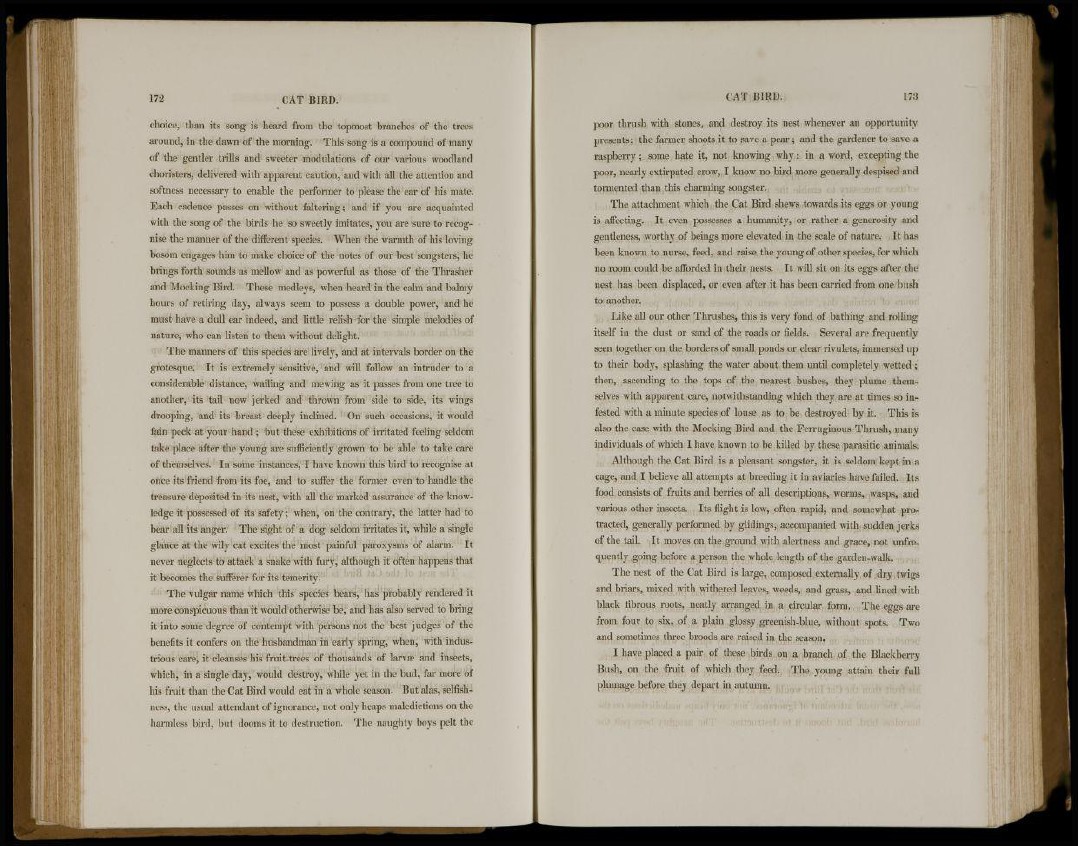
poor thrush with stones, and destroy its nest whenever an opportunity
presents; the farmer shoots it to save a pear; and the gardener to save a
raspberry ; some hate it, not knowing why: in a word, excepting the
poor, nearly extirpated crow, I know no bird more generally despised and
tormented than this charming songster.
The attachment which the Cat Bird shews towards its eggs or young
is affecting. It even possesses a humanity, or rather a generosity and
gentleness, worthy of beings more elevated in the scale of nature. It has
been known to nurse, feed, and raise the young of other species, for which
no room could be afforded in their nests. It will sit on its eggs after the
nest has been displaced, or even after it has been carried from one bush
to another.
Like all our other Thrushes, this is very fond of bathing and rolling
itself in the dust or sand of the roads or fields. Several are frequently
seen together on the borders of small ponds or clear rivulets, immersed up
to their body, splashing the water about them until completely wetted;
then, ascending to the tops of the nearest bushes, they plume themselves
with apparent care, notwithstanding which they are at times so infested
with a minute species of louse as to be destroyed by it. This is
also the case with the Mocking Bird and the Ferruginous Thrush, many
individuals of which I have known to be killed by these parasitic animals.
Although the Cat Bird is a pleasant songster, it is seldom kept in a
cage, and I believe all attempts at breeding it in aviaries have failed. Its
food consists of fruits and berries of all descriptions, worms, wasps, and
various other insects. Its flight is low, often rapid, and somewhat protracted,
generally performed by glidings, accompanied with sudden jerks
of the tail. It moves on the ground with alertness and grace, not unfrequently
going before a person the whole length of the garden-walk.
The nest of the Cat Bird is large, composed externally of dry twigs
and briars, mixed with withered leaves, weeds, and grass, and lined with
black fibrous roots, neatly arranged in a circular form. The eggs are
from four to six, of a plain glossy greenish-blue, without spots. Two
and sometimes three broods are raised in the season.
I have placed a pair of these birds on a branch of the Blackberry
Bush, on the fruit of which they feed. The young attain their full
plumage before they depart in autumn.
choice, than its song is heard from the topmost branches of the trees
around, in the dawn of the morning. This song is a compound of many
of the gentler trills and sweeter modulations of our various woodland
choristers, delivered with apparent caution, and with all the attention and
softness necessary to enable the performer to please the ear of his mate.
Each cadence passes on without faltering; and if you are acquainted
with the song of the birds he so sweetly imitates, you are sure to recognise
the manner of the different species. When the warmth of his loving
bosom engages him to make choice of the notes of our best songsters, he
brings forth sounds as mellow and as powerful as those of the Thrasher
and Mocking Bird. These medleys, when heard in the calm and balmy
hours of retiring day, always seem to possess a double power, and he
must have a dull ear indeed, and little relish for the simple melodies of
nature, who can listen to them without delight.
The manners of this species are lively, and at intervals border on the
grotesque. It is extremely sensitive, and will follow an intruder to a
considerable distance, wailing and mewing as it passes from one tree to
another, its tail now jerked and thrown from side to side, its wings
drooping, and its breast deeply inclined. On such occasions, it would
fain peck at your hand ; but these exhibitions of irritated feeling seldom
take place after the young are sufficiently grown to be able to take care
of themselves. In some instances, I have known this bird to recognise at
once its friend from its foe, and to suffer the former even to handle the
treasure deposited in its nest, with all the marked assurance of the knowledge
it possessed of its safety; when, on the contrary, the latter had to
bear all its anger. The sight of a dog seldom irritates it, while a single
glance at the wily cat excites the most painful paroxysms of alarm. It
never neglects to attack a snake with fury, although it often happens that
it becomes the sufferer for its temerity.
The vulgar name which this species bears, has probably rendered it
more conspicuous than it would otherwise be, and has also served to bring
it into some degree of contempt with persons not the best judges of the
benefits it confers on the husbandman in early spring, when, with industrious
care, it cleanses his fruit-trees of thousands of larva? and insects,
which, in a single day, would destroy, while yet in the bud, far more of
his fruit than the Cat Bird would eat in a whole season. But alas, selfishness,
the usual attendant of ignorance, not only heaps maledictions on the
harmless bird, but dooms it to destruction. The naughty boys pelt the